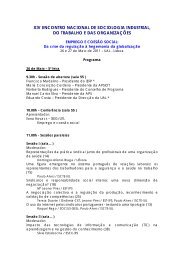Web-based Learning Solutions for Communities of Practice
Web-based Learning Solutions for Communities of Practice
Web-based Learning Solutions for Communities of Practice
Create successful ePaper yourself
Turn your PDF publications into a flip-book with our unique Google optimized e-Paper software.
The Argentine IT Pr<strong>of</strong>essionals Forum<br />
state agenda. Many issues are not included in this<br />
agenda. In view <strong>of</strong> the present crisis Argentina is<br />
going through, with its resulting poverty, hunger,<br />
and unemployment, it would seem politically<br />
incorrect to develop technological policies in<br />
order to improve the state’s per<strong>for</strong>mance. This<br />
is the case with the E-Government National Plan<br />
because it would mean an expense in hardware<br />
and s<strong>of</strong>tware, which is not a priority. The ITNO<br />
falls under this context, making it hard to fulfill<br />
its goals.<br />
With respect to the in<strong>for</strong>mal structure <strong>of</strong> networks<br />
and CoPs, governmental control is limited,<br />
causing certain uneasiness in political authorities.<br />
This situation could be reverted if the government<br />
became familiar with their functioning.<br />
In other countries, there are also misunderstandings.<br />
Snyder and Souza Briggs (2003, p.<br />
51) state that:<br />
there are several ways to address these concerns:<br />
by seeing the emergence <strong>of</strong> CoPs as an evolutionary<br />
process, not a cataclysmic revolution;<br />
by distinguishing the knowledge-building and<br />
knowledge-sharing functions <strong>of</strong> these communities<br />
with the primarily transactional focus <strong>of</strong> product-<br />
and service-delivery units; and by understanding<br />
that collaborative, boundary-crossing networks<br />
need not mark the loss <strong>of</strong> government’s publicservice<br />
identity and influence, but rather serve as<br />
an expansion <strong>of</strong> both.<br />
Another interesting topic has to do with the<br />
possibilities to develop free s<strong>of</strong>tware in a context<br />
<strong>of</strong> scarcity <strong>of</strong> resources.<br />
Indeed, it is a hard task to develop s<strong>of</strong>tware<br />
without the necessary resources. However, it<br />
should be remembered that the ITPF is made up<br />
<strong>of</strong> several organizations that may be working on<br />
s<strong>of</strong>tware developments with their own resources<br />
(<strong>for</strong> example, the AFIP, the Argentinean tax<br />
agency; ANSES, the pension funds administrator,<br />
and the Central Bank). This s<strong>of</strong>tware is usually<br />
made available in order to test its applicability<br />
in other sectors.<br />
It goes without saying that every agency where<br />
the s<strong>of</strong>tware is applied will need its own resources<br />
so that the s<strong>of</strong>tware can be implemented and the<br />
necessary training supplied. In some cases, directives<br />
from the ITNO are required.<br />
I have mentioned earlier some ways in which it<br />
has been possible to generate a network <strong>for</strong> the creation<br />
<strong>of</strong> LINUX training courses. I should add that<br />
the group <strong>of</strong> tutors is made up <strong>of</strong> IT experts who<br />
share their knowledge. Their tutoring is almost<br />
free. Moreover, they have designed courses <strong>for</strong><br />
public <strong>of</strong>ficials. It should be noticed that it would<br />
have been hard to find enough LINUX teachers<br />
<strong>for</strong> this task, and the few available ones would<br />
have charged very high fees. If this had been the<br />
case, the courses would not have started.<br />
The fourth challenge I would like to refer to<br />
is how the ITPF can broaden the pr<strong>of</strong>essional<br />
competencies <strong>of</strong> IT experts.<br />
The ITPF has come a long way. At its inception,<br />
the members were against interacting with other<br />
systems, actors, or <strong>for</strong>ums. Nowadays, they are<br />
starting to change this attitude <strong>of</strong> isolation, interacting<br />
with legislators, scholars, lawyers, humanresources<br />
directors, and front-desk chiefs.<br />
The evolution <strong>of</strong> the ITPF is also reflected in<br />
the language its members have been adopting.<br />
Rather than just using IT jargon, they have integrated<br />
IT terms into an interlinguistic field. This<br />
attitude helps to include the addressees’ needs by<br />
letting them have a say in their decisions. Broadly<br />
speaking, IT experts are responsible <strong>for</strong> showing<br />
the way in which technology can be used to<br />
improve decision-making processes. Thus, they<br />
should be familiar with public-administration<br />
rules and the specific needs <strong>of</strong> public <strong>of</strong>ficials.<br />
The ITPF has contributed to collective knowledge<br />
about the culture <strong>of</strong> organizations in connection<br />
with in<strong>for</strong>mation and technology, the rules <strong>of</strong> the<br />
game, as well as the implicit hierarchies and their<br />
in<strong>for</strong>mal structure.<br />
Through their own experience at the ITPF, its<br />
members have also learned to work in networks<br />
to perceive the environment, communicate skills,<br />
295



